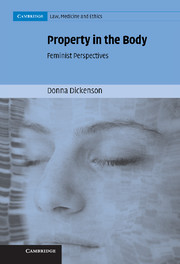Book contents
- Frontmatter
- Contents
- Acknowledgements
- Preface
- 1 Do We All Have ‘Feminised’ Bodies Now?
- 2 Property, Objectification and Commodification
- 3 The Lady Vanishes: What's Missing from the Stem Cell Debate
- 4 Umbilical Cord Blood Banks: Seizing Surplus Value
- 5 The Gender Politics of Genetic Patenting
- 6 Biobanks: Consent, Commercialisation and Charitable Trusts
- 7 The New French Resistance: Commodification Rejected?
- 8 Tonga, the Genetic Commons and No Man's Land
- 9 Afterword
- Bibliography
- Index
Preface
Published online by Cambridge University Press: 15 December 2009
- Frontmatter
- Contents
- Acknowledgements
- Preface
- 1 Do We All Have ‘Feminised’ Bodies Now?
- 2 Property, Objectification and Commodification
- 3 The Lady Vanishes: What's Missing from the Stem Cell Debate
- 4 Umbilical Cord Blood Banks: Seizing Surplus Value
- 5 The Gender Politics of Genetic Patenting
- 6 Biobanks: Consent, Commercialisation and Charitable Trusts
- 7 The New French Resistance: Commodification Rejected?
- 8 Tonga, the Genetic Commons and No Man's Land
- 9 Afterword
- Bibliography
- Index
Summary
In the two years since I started writing this book, property in the body has become the most topical of topics. Two recent scandals, in particular, have elevated it to a dubious pre-eminence: the theft of the late broadcaster Alistair Cooke's bones by a criminal ring which sold them for US$7,000 to a dental implants company, and the revelation that the supposed stem cell breakthroughs by Prof. Hwang Woo Suk used 2,200 ova in the course of research that turned out to be entirely fraudulent. From its earlier low obscurity, property in the body has risen to such heights of interest that the reader could be excused for asking, ‘What more could I possibly want to know about this topic?’
Luckily, or unluckily, there is still a great deal to bring to light, and a particular kind of illumination required. The rise of private umbilical cord blood banking, for example, has not yet made the media headlines. What coverage it has received in the popular and scholarly literature has been based on false assumptions, including what I present in chapter 4 as the mistaken presumption that the cord blood is the baby's and not the mother's, even though she puts effort into its extraction. Why that assumption has taken root has to do, along with other large misconceptions and abuses such as those perpetrated by Hwang, with particular blind spots: gendered ways of thinking about property in the body.
- Type
- Chapter
- Information
- Property in the BodyFeminist Perspectives, pp. x - xivPublisher: Cambridge University PressPrint publication year: 2007

